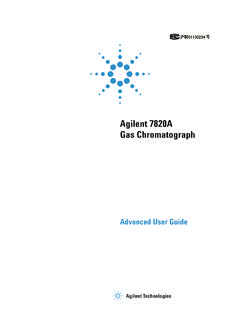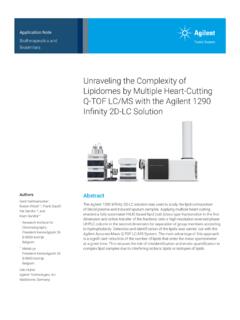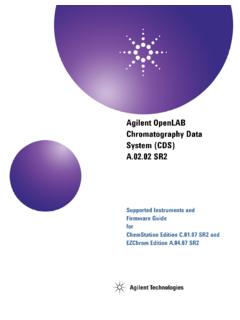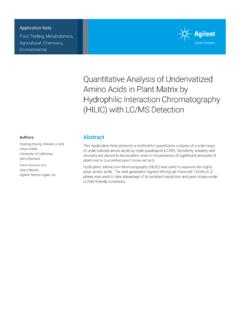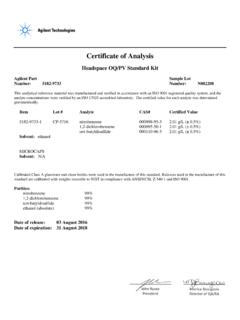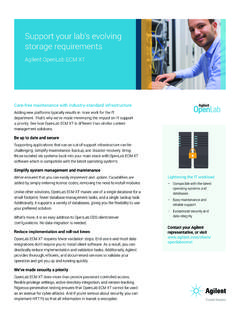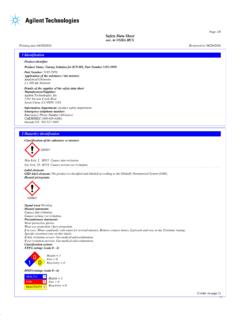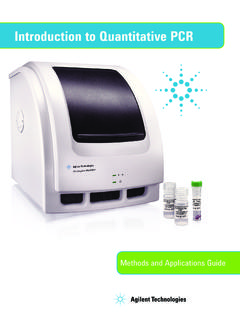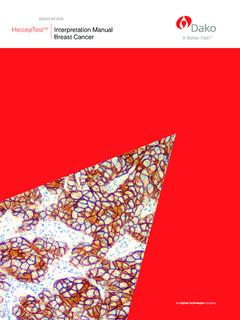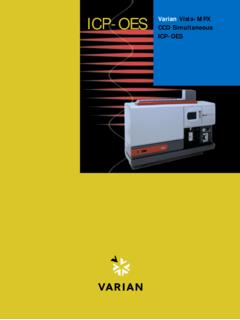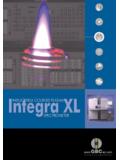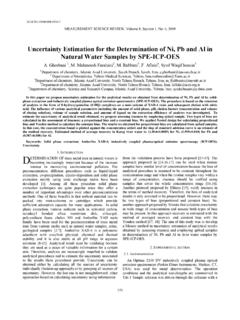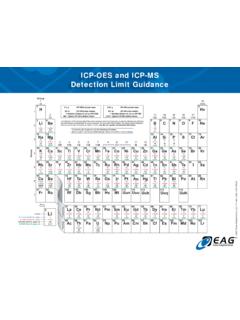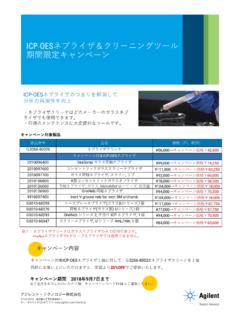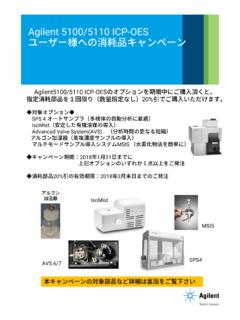Transcription of Guidelines for Trouble Shooting and Maintenance …
1 Guidelines for Trouble Shooting and Maintenance of ICP-OES Systems Presented by Eric Vanclay, Spectroscopy Supplies Marketing Manager ICP-OES Maintenance & Trouble Shooting Nov. 2016 Agilent s Atomic Spectroscopy Portfolio Agilent s 55 and 200 Series includes Fast Sequential flame AA and high performance furnace. Agilent s 4210 MP-AES runs on air for the lowest cost of ownership and improved safety. Agilent s 5110 ICP-OES includes the world s most productive, and only Synchronous Vertical Dual View ICP-OES. Agilent s 7800 & 7900 ICP-MS are robust, sensitive, accurate, and easy to use quadrupole ICP-MS Agilent s 8900 ICP-QQQ with MS/MS mode provides unique control of interference removal in reaction mode Leading the way in atomic spectroscopy innovation Flame AA MP-AES ICP-OES ICP-MS ICP-QQQ ICP-OES Maintenance & Trouble Shooting Nov.
2 2016 2 Fastest sample throughput Low gas consumption Longer component life Reduced Maintenance costs Lowest Cost of Ownership No compromise on speed, precision or stability System robustness and reliability Rapid qualitative screening Enhanced Analytical Performance Easy setup Faster method development Easy access to sample introduction components Fully integrated valve hardware Simple Operation Agilent 5110 SVDV ICP-OES Performance Highlights Dual View Minus the Wait! ICP-OES Maintenance & Trouble Shooting Nov. 2016 3 Agilent 4210 MP-AES Performance Highlights Uses nitrogen for the emission source No hollow cathode lamps and no deuterium lamps Lower Cost of Ownership No flammable gases No manual cylinder handling Safer Lower detection limits compared to FAAS Larger linear dynamic range compared to FAAS Higher Performance Intuitive software with auto optimization Plug and play sample introduction Easier to Use ICP-OES Maintenance & Trouble Shooting Nov.
3 2016 4 Agilent 8900 Triple Quadrupole ICP-MS Superior Performance Controlled reaction chemistry for consistent, reliable results Resolution of isobaric overlaps (beyond capability of high-resolution ICP-MS) Lowest detection limits, even for previously difficult elements: S, Si, Unparalleled Flexibility 4-channel cell gas control as standard Unique MS/MS scan modes for research and method development The most exciting and versatile ICP-MS for research and method development! LEAVE INTERFERENCES BEHIND WITH MS/MS Put your results beyond doubt with the Agilent 8900 ICP-QQQ ICP-OES Maintenance & Trouble Shooting Nov.
4 2016 5 Common ICP Problems Reported by Customers Sensitivity: Sensitivity is worse than it used to be I have a new application and I can t get the sensitivity I need I need lower detection limits for As & Se How come I can t get the instrument to meet published detection limits? Precision Sensitivity is acceptable but precision is terrible High noise Can get the right answers , but very noisy signal this is also giving bad precision. Accuracy Instrument does not give the right results My check standards drift Poor Sample Throughput The instrument throughput needs to improve Nebulizer and/or injector of the torch blocks too quickly 6 ICP-OES Maintenance & Trouble Shooting Nov.
5 2016 Causes of Poor ICP-OES Sensitivity Worn pump tubing Blocked nebulizer Blocked injector in torch Poor optimization especially the neb. flow Method setting using right wavelength? Wrong tubing type Interferences High blank level Standards prepared correctly? Samples prepared correctly? ionization suppressant Optics purge UV wavelengths only Spray chamber type 7 Sample introductionsystem Optimization Standard (& sample) preparation ICP-OES Maintenance & Trouble Shooting Nov. 2016 Causes of Poor ICP-OES Precision Worn pump tubing Beading in spray chamber Nebulizer condition and performance Air leaks in transfer tubing Torch alignment Poor optimization especially the neb.
6 Flow Nebulizer choice for your samples Wash-out (memory effects) 8 Sample introductionsystem Optimization Standard (& sample) preparation ICP-OES Maintenance & Trouble Shooting Nov. 2016 Causes of Poor Accuracy in ICP-OES Worn pump tubing Blockage in nebulizer and/or torch Wrong wavelength choice - interferences Poor optimization especially the neb. flow Choice of internal standard Insufficient stabilization time Standard preparation Incomplete digestion particles in solution No matrix matching Wash-out (memory effects) 9 Sample introductionsystem Optimization Standard (& sample) preparation ICP-OES Maintenance & Trouble Shooting Nov.
7 2016 ICP-OES Sample Introduction System Tips Do: Check optimization each analysis Check/monitor the nebulizer uptake Check/adjust the peri pump tubing Check the blank reading Rinse between samples & at the end of the run -Rinse should match sample matrix Clean the torch/nebulizer regularly -Inspect condition of the nebulizer tip Follow analytical recommendations in cookbook Don t: Assume system is still optimized Assume nebulizer flow rate is the same Overtighten the pressure adj. screw Use a simple water blank Wait until you have blockage before cleaning 10 ICP-OES Maintenance & Trouble Shooting Nov.
8 2016 Peri Pump Tubing Tips -Tubing diameters Want tubing used for waste to be larger ID than sample ID -Chemical compatibility Ensure tubing is resistant to the solvent being used -Replace frequently Using old tubing can lead to problems with precision and stability Typical lifetime is 1-2 weeks based on normal 8 hour working day -Detach from tube holder after use allows tube to relax -Maintaining tubes What to check? Check 2 key things on pump tubing -Roundness of tube should not be any flat spots -Tubing should still be elastic replace if obviously stretched Don t over tighten just need smooth and even sample flow -Remember to check other tubing for wear, leaks and crimps 11 ICP-OES Maintenance & Trouble Shooting Nov.
9 2016 Cleaning the Nebulizer Never sonicate or attempt to clean with wire! For normal cleaning: Reverse pump the nebulizer with the tip in solvent; OR Apply suction from the wide end of the capillary using a vacuum aspirator; OR Apply high pressure clean air via a tubing snugly fitted over the nebulizer tip (use with caution); OR Use a dedicated nebulizer cleaning tool to force methanol solution through the tip For salt deposits: Soak the nebulizer overnight in a beaker of 25% Fluka RBS-25 detergent. Rinse with pure water For stubborn deposits: Soak the nebulizer overnight in conc.
10 Nitric acid. Use a pipette to ensure there are no air bubbles in capillary. Rinse with pure water 12 Suction Pressure Nebulizer cleaning tool P/N G3266-80020 modified from Pneumatic Nebulisers and Spray Chambers for Inductively Coupled Plasma Spectrometry. A Review, Part 1. Nebulisers by Barry Sharp, JAAS, , p. 613-652, 1988 provided by Meinhard Glassblowing Products ICP-OES Maintenance & Trouble Shooting Nov. 2016 Performance Characteristics of Common Nebulizers Nebulizer Type Aerosol Efficiency Achieved Precision Dissolved Solids Tolerance HF Resistance Organics Compatibility Self Aspirates Ideal Sample Type OneNeb Excellent Excellent Good (max.)
